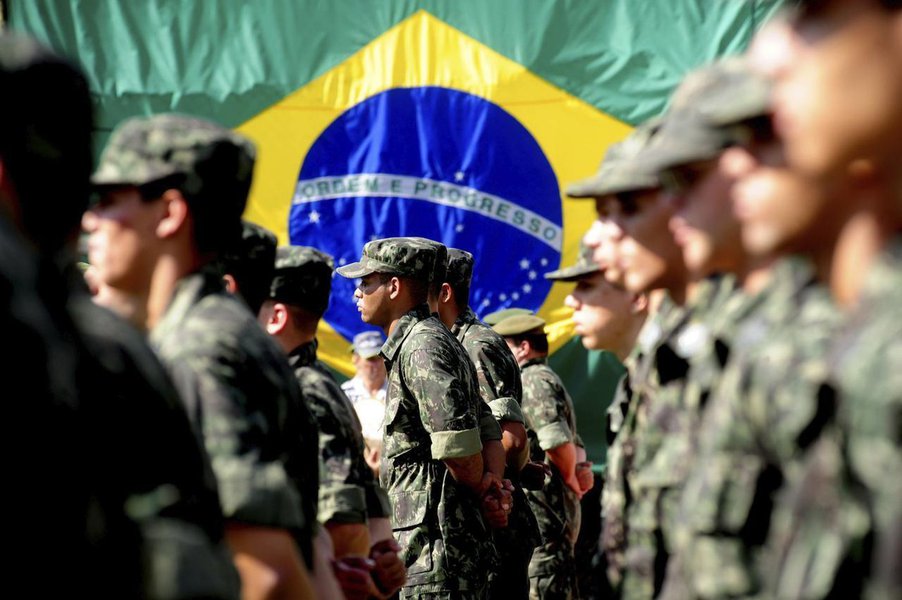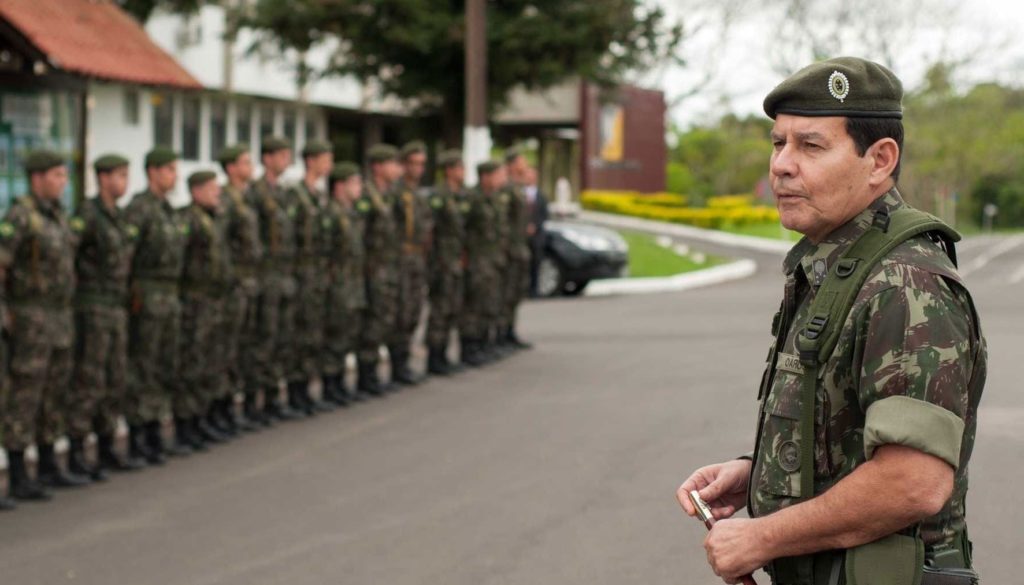RIO DE JANEIRO, BRAZIL – The Armed Forces Command in Brazil has made an unusual public move to distance itself from President Jair Bolsonaro on Monday, but the military, who have never been this powerful in Brazil since the end of the dictatorship, is still far from potentially divorcing itself from government.

One day after the President sought to rely on the Armed Forces’ high degree of reliability by saying that it was at his side in a pro-military demonstration -and stressing that patience with other institutions was running out-, the Minister of Defense, General Fernando de Azevedo e Silva, issued a note to stress what should be obvious: that the Navy, the Army, and the Air Force respect the law and are committed to democracy and to the “harmony” and “independence” of powers, in addition to disavowing attacks on journalists.
“The Armed Forces will always be on the side of law, order, democracy, and freedom. This is our commitment”.
The President was looking for support for a particular annoyance: Federal Supreme Court (STF) Justice Alexandre de Moraes’ ruling, which prevented him from appointing detective chief Alexandre Ramagem as Director General of the Federal Police (PF).
“We have reached our limit, there is no more talking, from now on we will not only demand, we will enforce the Constitution, it will be enforced at any cost, and it is a two-way street,” said Bolsonaro on Sunday as he took part for the third time in a demonstration calling for the closure of the STF and Congress.
Ramagem is a friend of Bolsonaro’s sons and there was a suspicion, raised by ex-Minister Sérgio Moro, that the new PF chief would politically interfere in the body in favor of the President. As Ramagem cannot take over the position, his number two in the Brazilian Intelligence Agency (ABIN), Rolando Alexandre de Souza, took over the PF’s direction on Monday.
If part of the military leadership is ready to agree with Bolsonaro that the STF has overstepped its role by vetoing Ramagem, on the other hand, it does not seem willing to endorse the President’s participation in radical demonstrations.
Despite the military’s message on Monday, in practice, they have never been this present in power since redemocratization in the late 1980s. Armed Forces officers and graduates of academies and the State Police hold nine of the 22 cabinet Ministries.
They are also active in dozens of second and third echelon executive positions. When the President wants to supervise a Minister, as in the case of Nelson Teich in Health, he places a military man as his number two.
The military’s open struggle now is to try to keep the contingent of forces away from the more heated presidential speeches. The main articulator of this attempt at isolation is the army commander, General Edson Leal Pujol.
When he was forced to define logistical strategies to get the Forces to help fight the coronavirus pandemic, Pujol warned the commanders of the 12 military regions that the main thing was “to show service and leave politics to the politicians,” according to a high-ranking officer.
The Ministry of Defense’s note on Monday was unequivocal in making a difference in the approach to Covid-19: “We are facing a pandemic with as yet unpredictable health and social consequences, which requires effort and understanding by all,” reads the text signed by Fernando de Azevedo e Silva, who was once an advisor to the STF presiding justice, Antonio Dias Toffoli, before taking office.
In March, while Bolsonaro was reinforcing on national radio and television networks his denialist discourse on the gravity of the disease, and was more concerned with the economy than with health, Pujol recorded a video for Army channels saying that the moment required “care and prevention” and that this was perhaps “the most significant mission of our generation”.
Regarded as a professional of few words, who has already declared his opposition to military intervention while having no connections in the party-political universe, Pujol knows how to send his messages between the lines. While virtually the whole of Bolsonaro’s retinue is participating in ceremonies in the Planalto, the Army commander avoids them as much as he can. He was not present at General Walter Braga Netto’s swearing-in ceremony, nor in those of André Mendonça and José Levi Amaral, as Minister of Justice and as Solicitor General of Brazil, respectively.
On Sunday, Bolsonaro again tested the receptivity to one of his political moves or decisions: he told his allies that he could replace Pujol later this year with General Luiz Eduardo Ramos, the current Minister of the Government Secretariat, one of very few active-duty generals serving in the government).
The message that came back from the barracks was that whoever the substitute would be, he would face rejection. Soon, Bolsonaro sent his advisors to deny the news. Ramos himself was one of those who claimed that the exchange would make no sense, that it was an “absurd hypothesis” and that he respected the hierarchical line of internal promotion.
Today, the Minister would be ranked sixth on the list to take overall command, taking into account the seniority of active-duty generals. “With what kind of leadership would I go to command the Army overstepping the five most senior, with an appointment, in quotes, politics? And the President at no time discussed, thought about, or spoke to anyone about it,” Minister Ramos told reporters.

Support and concerns
As it has often been on Mondays in Brasília, after Bolsonaro’s provocativeattending pro-coup demonstrations on weekends, the day was one of gauging political tension. If he took note of the Armed Forces’ warning, Bolsonaro also garnered important support, that of the vice-president reserve General Hamilton Mourão in the dispute with the STF.
In an interview, Mourão said that “everyone has to operate within the boundaries of their responsibilities,” in reference to Moraes’ decision that prevented the appointment of Ramagem. Mourão continued his defense on his Twitter account: “At this time when the national environment is being clouded by discord and intrigue, it is important to make clear, as President @jairbolsonaro declared yesterday, that no one will disregard the Constitution. Now, each Power has its boundaries and responsibilities”.
Meanwhile, representatives of other powers, as has also been customary, have issued notes of repudiation in light of Bolsonaro’s menacing statements at demonstrations. On Sunday, Chamber president Rodrigo Maia recalled two incidents of physical attacks on the President’s opponents and press professionals over the weekend.
“Yesterday nurses were threatened. Today journalists were attacked. Tomorrow it will be anyone who opposes their worldview. It is up to democratic institutions to impose legal order on this group that confuses politics with terror”, said the deputy. It is up to Maia himself, however, to proceed with one of the 29 motions to impeachment in the Chamber.
He has already said he will not do so, for the time being, because his priority is to deal with the fight against the Covid-19 pandemic, something that is absent from the presidential agenda.
Luís Roberto Barroso, one of the STF’s most progressive Justices, said during an interview that he’s concerned about seeing the Armed Forces mentioned in political demonstrations.
But he does not believe they would embark on a coup adventure. “I don’t see the slightest possibility that these professionalized Armed Forces with a commitment to Brazil will accept being pulled, dragged, into this political patchwork,” he said.
In spite of indignation, Bolsonaro proceeds with his plans, governing by means of a confrontational strategy. Having failed to place Ramagem in the PF, he anointed Rolando Alexandre de Souza, and he still intends to change the command of the police force in Rio, where Bolsonaro’s family and allies have interests.
The Planalto has negotiated positions with representatives of the “old politics” in the congressional Centrão, something he often said he would not do, and for the time being this has at least yielded him public defenses from leaderships in his dispute with the STF.
The tone of the next few days should be set by the course of the inquiry into Sérgio Moro’s allegations against Bolsonaro. On Saturday, the former Minister, who left office alleging potential criminal actions by the President, testified to the Federal Police. Now he wants his entire deposition to be made public.
Source: El País

